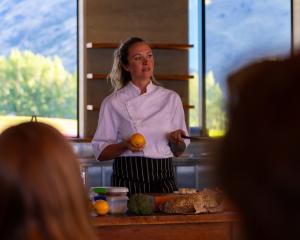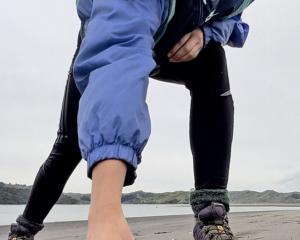
Dunedin on a good day is one of my favourite places in the world. There are those beautiful spring days when students finish exams and migrate back to where they came from, meaning that parents with trailers are suddenly very popular with their offspring. Spring is also the season for the annual Strengthening Communities Hui and this year it was in Dunedin. Flat clean-out, zero waste inspiration and Dunedin in spring — I was in!

This was the first time the Strengthening Communities Hui had been in Dunedin, and the city showed us its best face. The sun and the rhododendrons were out, the university campus was looking stunning and the streets ... . well the streets were scattered with the remnants of flat clean-outs and rubbish waiting to be taken away. Rubbish in bags, wheelie bins, on the street, under trees and in the front yards.
Students are a fascinating group if you’re interested in social norms and behaviours. Students, on the whole, are extremely price-sensitive (i.e., broke). Living surrounded by other students, they are very influenced by their peers, even to the point of shifting flats every year to be in the appropriate zone for their year-group. They are also setting new habits, and there’s a lot to learn when you’ve just left home.
In many communities, user-pays rubbish bags can work positively to incentivise waste reduction. However, in the communal flats of the student zone, the consequences of user-pays rubbish bags is some pretty ugly fly-tipping behaviour. When the choice goes something like beer, food or council rubbish bag, we can guess what’s likely to be squeezed out of the shopping list. And once one flat starts rubbish dumping, it’s a visible signal that it’s OK to dump rubbish. That lowers the barriers for others, and before you know it, dumping rubbish becomes a pretty normal behaviour, as I saw in the vicinity of my son’s flat.
I don’t envy the Dunedin City Council the job of keeping the student area clean. In July 2024, the city will move to wheelie bins for rubbish, which should reduce the rubbish dumping by providing each flat with a wheelie bin. They also have some good initiatives in place with free transfer station drop-offs for students and diversion days on Castle St.
But it takes more than wheelie bins to change a culture. That’s why I love the University of Otago’s project to set up a Wastebusters-style zero waste hub on the edge of campus. Te Oraka opens as a second-hand shop for students a couple of days a week during term time. Run by student leads, it provides students with a space to support reuse, but more importantly, it is a place to connect with others and create a culture of fun and sustainability. Te Oraka holds night markets and other events to connect students and create a resourceful community.
Earlier this year, Te Oraka won the International Green Gown Award for student engagement, an epic achievement given that any university worldwide can enter. The award judges said Te Oraka showcased "a superb student-led initiative that notably has clear outcomes, can be replicated, and is yielding impressive results. Underpinned by the circular economy (reusing, repairing, recycling etc) it is leading to systemic change" .
Te Oraka’s biggest initiative is the annual Drop for Good collection of flat furniture at the end of the uni year, which is supported by the OUSA student executive. All reusable furniture and belongings are stored over the summer and resold to students at bargain prices to furnish new flats at the start of the following year. While we were in Dunedin for the Strengthening Communities Hui, the Wastebusters crew got to see inside Te Oraka, right after this year’s Drop for Good.
With polished wooden floors, it looked like an upmarket furniture warehouse: rows and rows of drawers, couches stacked two high, racks of second-hand lab coats, "flat set-up" banana boxes of plates, cups and cutlery, racks of clothing and every kitchen utensil you could imagine. All of it was just waiting for the influx of returning students to go back out into the student world again when Shop for Good runs in February.
It makes so much sense and meets everyone’s needs — the students moving out, the students moving in, and the council in reducing waste to landfill (and the associated costs). In 2021-22, 80 tonnes was diverted from landfill, and each Drop for Good has been more successful than the last.
It only takes a quick look at their Instagram page to see why Te Oraka is so successful in engaging their community — their approach is fun, creative, and effortlessly cool. They also deeply understand their community, because they are part of it. Phoebe, the student lead who showed us round Te Oraka, was talking about getting vans to run a furniture drop-off service for Shop for Good in February, because most students don’t have nearby parents with trailers. It’s a great example of why the understanding of and connection to the community makes community-led behaviour change so powerful.
One of the speakers I most enjoyed at the Strengthening Communities Hui was Janet Stephenson, the director of the University of Otago’s Centre for Sustainability. She spoke about culture being a mix of "having", "thinking" and "doing". Her academic work helps to explain why community-led behaviour change is impactful and cost-effective. It also helps to explain something we all know intuitively — that the people we respect and socialise with are instrumental in influencing our behaviours.
The big environmental issues, such as climate change, waste and biodiversity loss, can’t be solved by a top-down approach. It’s not just the council’s problem, or the Government’s problem. Yes, local and central government have a big role in providing the infrastructure and funding to enable the behaviours we want to see. But we also need more dedicated people, like the student leads at Te Oraka, working in their own communities to get people to join in and make their communities stronger.
Gina Dempster is Wastebusters general manager. Each week in this column, one of a panel of writers addresses issues of sustainability.













